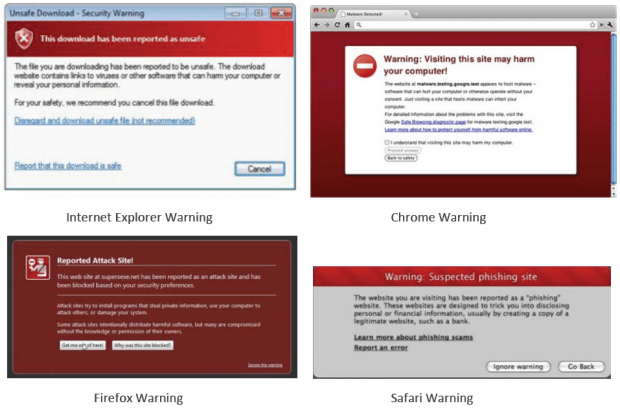Internet Explorer has a bad rap when it comes to security, primarily thanks to the prolonged usage of IE6 by the general public. If an independently-conducted study is to be believed, Microsoft has really turned things around with Internet Explorer 9. More specifically, a study by NSS Labs says Internet Explorer is better at blocking malware than Chrome, Firefox, and Safari… combined.
NSS Labs, which describes itself as “a leader in test-based research and analysis of information security products”, conducted a study for 175 days (December 2, 2011 to May 25, 2012) testing how Internet Explorer (v9), Chrome (v15-19), Firefox (v7-13), and Safari (v5) protect users against malware related to bank fraud, password theft, fake antiviruses, and click fraud. The result? With a 94% malware block rate, Internet Explorer wipes the floor with the other three:
NSS Labs does not specify exactly what type of malware it tested for but they do mention that they tested 227,841 “unique and suspicious” URLs. Out of these 227,841, 84,396 were active during the testing period. NSS Labs did a total of 3,038,324 tests of these 84,396 URLs (i.e. NSS Labs accessed these URLs over three million times over the entire study to see if the browsers would block them and/or the related downloads), or about roughly 750,000 tests for each browser. NSS Labs performed “post-validation procedures” to eliminate roughly half of the three million tests (because of false positives, adware, etc.), eventually using 1,407,233 tests as data to come to the final results shown above.
So why exactly does Internet Explorer beat out the others? Well apparently it is thanks to Microsoft’s SmartScreen which is a cloud-based security tool baked into Internet Explorer that analyzes URLs and tries to find known malicious ones, which are then blocked if you access them. The other three browsers –Chrome, Firefox, and Safari — utilize Google’s SafeBrowsing to detect malicious URLs while Chrome also uses Google’s malicious download detecting technology.
While it isn’t exactly surprising that Microsoft one-ups the competition when it comes to anti-malware (after all, Microsoft has been in the anti-malware business for a while now, long before Google, Mozilla, and Apple), what is surprising is the huge difference between what IE blocks and what the others block. It really is incredible that IE is able to block 94% while the next closest is Chrome with 27.6%.
Of course it is hard to make conclusive judgements of IE vs Chrome vs Firefox vs Safari malware blocking capabilities until there is more information provided as to exactly what malware NSS Labs tested for and what URLs were used. Still, NSS Labs claims to have independently conducted this study so we can’t simply write it off as Microsoft propaganda. Maybe this is why Google bought VirusTotal.
Anyone that wants to read more about NSS Labs’ tests can hit up the links below which detail what NSS Labs did and its findings; the first one is for the overall study while the second one specifically looks at blockage of click fraud.

 Email article
Email article




